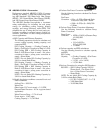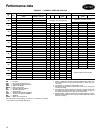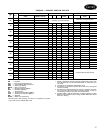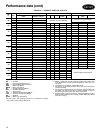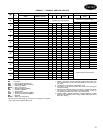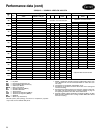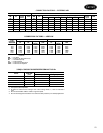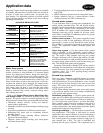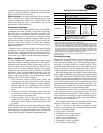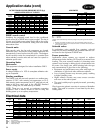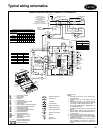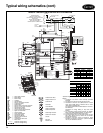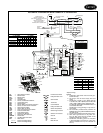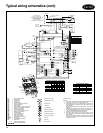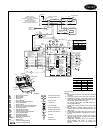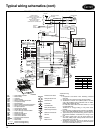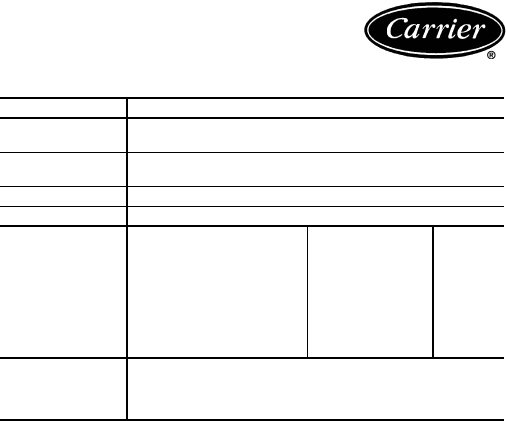
23
concealed below ground. The number of loops required de-
pends on ground conditions, heating and cooling require-
ments, and the depth of each hole.
Hybrid systems — In some applications, it may be bene-
ficial to incorporate a cooling tower into the ground loop
system to reduce the overall cost. A Hybrid System dis-
cards excess heat into the air and increases the cooling
performance of the ground loop.
Condensate drainage
Connect the console unit condensate drain to the building
condensate drain with a flexible, non-pressure rate plastic
hose. Be sure to avoid kinks in this hose to ensure an un-
obstructed flow of condensate from the unit to the drain.
The condensate hose’s horizontal run is usually too short
to pose any drainage problems, however, make sure this
line is pitched at least 1 inch for every 10 feet of run (in the
direction of the flow.) Avoid low points and unpitched
piping since dirt collects in these areas and may cause stop-
page and overflow.
Installing a trap or drain in the field is not required unless
specified by local codes. The 50KQL units are designated
in a blow-thru configuration. The condensate drain pan is
located on the outlet side of the blower so that the pressure
in the drain pan is higher than the atmospheric pressure.
Water conditioning
In some applications, maintaining proper water quality
may require higher corrosion protection for the water-to-
refrigerant heat exchanger. Water quality varies from loca-
tion to location and is unique for each job. Water charac-
teristics such as pH value, alkalinity, hardness, and specific
conductance are important when considering any WSHP
application. Water typically includes impurities and hard-
ness that must be removed. The required treatment de-
pends on the water quality as well as system type. Water
problems fall into three main categories:
1. Scale formation caused by hard water reduces the
heat transfer rate and increases the water pressure
drop through the heat exchanger. As water is heated,
minerals and salts are precipitated from a solution
and deposited on the inside surface of the pipe or
tube.
2. Corrosion is caused by absorption of gases from the
air coupled with water on exposed metal. Corrosion
is also common in salt-water areas.
3. Organic growths, such as algae, can reduce the heat
transfer rate by forming an insulating coating on the
inside tube surface. Algae can also promote corrosion
by pitting.
NOTE: In most commercial water loop applications, Aqua-
zone™ WSHP units use copper water-to-refrigerant heat
exchanger. Units can also be equipped with a Cupronickel
heat exchanger for applications where water is outside the
copper heat exchanger’s standard contaminant limits.
WATER QUALITY GUIDELINES
*If the concentration of these corrosives exceeds the maximum allowable level,
then the potential for serious corrosion problems exists.
†Sulfides in the water quickly oxidize when exposed to air, requiring that no agita-
tion occur as the sample is taken. Unless tested immediately at the site, the
sample will require stabilization with a few drops of one Molar zinc acetate solu-
tion, allowing accurate sulfide determination up to 24 hours after sampling. A low
pH and high alkalinity cause system problems, even when both values are within
ranges shown. The term pH refers to the acidity, basicity, or neutrality of the
water supply. Below 7.0, the water is considered to be acidic. Above 7.0, water is
considered to be basic. Neutral water contains a pH of 7.0.
NOTE: To convert ppm to grains per gallon, divide by 17. Hardness in mg/l is
equivalent to ppm.
Acoustical design
Sound power levels represent the sound that the source, the
WSHP unit, produces with no regard to attenuation be-
tween the source and the space. Acoustical design goals are
necessary to provide criteria for occupied spaces. These
goals help ensure that people can be comfortable and com-
municate effectively over the background noise of the air-
conditioning system and other background noise sources.
Acoustical design goals are desirable sound pressure levels
within a given conditioned space and are represented by Noise
Criteria (NC) curves. Noise Criteria (NC) curve levels represent
a peak over a full frequency spectrum. A high value in a low
frequency band has the same effect on NC level as a lower val-
ue in a high frequency band. It is important that sound levels
be balanced over the entire spectrum relative to the NC curve.
The lower the NC criteria curve, the more stringent the room
acoustical design must be to meet the design goals.
It is important to know how to convert the unit ratings
from sound power (Lw) to sound pressure (Lp). This con-
version depends on the specifics of the installation’s acous-
tical environment. Assessing an area’s acoustical design re-
quires that you compare the sound pressure (Lp) with the
NC curve for the selected area.
The resulting calculations are compared to the NC curve
selected for the area to assess the acoustical design.
Some of the factors that affect conversion of sound
power to sound pressure and consequent NC level include:
• Type of acoustical ceiling
• Use of metal or flex duct
• Absorption in the occupied space
• Location in the occupied space
• Open or closed layout plan
• Use of open or ducted returns
• Orientation of unit to occupant
• Use of lined or unlined duct
CONDITION ACCEPTABLE LEVEL
pH
7 to 9 range for copper. Cupronickel may be
used in the 5 to 9 range.
Total Hardness
Calcium and magnesium carbonate should not
exceed 20 grains per gallon (350 ppm).
Iron Oxides Less than 1 ppm.
Iron Bacteria No level allowable.
Corrosion*
Max Allowable
Level
Coaxial
Metal
Ammonia,
Ammonium Hydroxide
0.5 ppm Cu
Ammonium Chloride,
Ammonium Nitrate
0.5 ppm Cu
Ammonium Sulfate 0.5 ppm Cu
Chlorine/Chlorides 0.5 ppm CuNi
Hydrogen Sulfide† None Allowable —
Brackish
Use Cupronickel heat exchanger when
concentrations of calcium or sodium chloride
are greater than 125 ppm are present.
(Seawater is approximately 25,000 ppm.)



